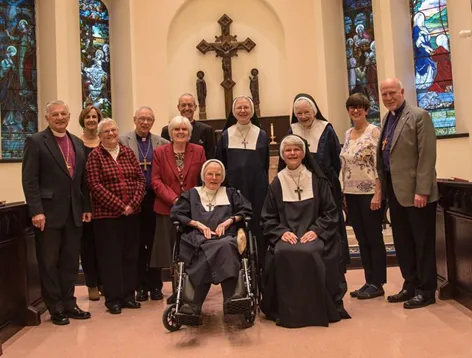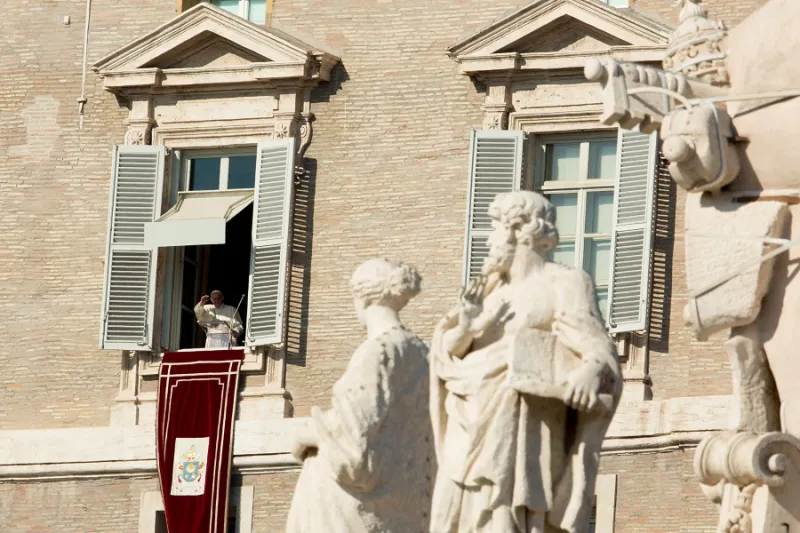 Sisterhood of Saint Mary with bishops from the Anglican Church of North America’s Diocese of the Living Word. / Courtesy of Becket.
Sisterhood of Saint Mary with bishops from the Anglican Church of North America’s Diocese of the Living Word. / Courtesy of Becket.
Washington D.C., Nov 1, 2021 / 15:56 pm (CNA).
Foes of mandatory coverage of abortion in New York State insurance law will have another hearing after the U.S. Supreme Court ordered a New York state court to reconsider their decision. The law’s narrow religious exemption wrongly disqualifies many religious groups which object to providing abortion, critics said.
A group of Anglican nuns is among the objectors.
“We believe that every person is made in the image of God,” said Mother Miriam of the Sisterhood of Saint Mary, an Anglican body. “That’s why we believe in the sanctity of human life, and why we seek to serve those of all faiths—or no faith at all—in our community. We’re grateful that the Supreme Court has taken action in our case and hopeful that, this time around, the New York Court of Appeals will preserve our ability to serve and encourage our neighbors.”
The Sisterhood of Saint Mary, also known as the Sisters of the Community of St. Mary, is aligned with the Anglican Church in North America. It was founded in 1865 and claims to be the oldest Anglican religious order in the United States.
The Anglican sisters are part of a coalition of religious groups challenging the New York State mandate requiring employers to cover abortions in their health plans. They are represented by attorneys from the religious freedom legal group Becket and the law firm Jones Day.
Eric Baxter, vice president and senior counsel at Becket, alluded to the Little Sisters of the Poor who fought a years-long court battle to secure relief from a federal mandate to cover contraceptive drugs, including drugs that can cause abortions.
“New York clearly learned nothing from the federal government’s own attempts to force nuns to pay for contraceptives and is now needlessly threatening charities because they believe in the dignity and humanity of every human person,” Baxter said Nov. 1.
“Punishing faith groups for ministering to their local communities is cruel and counterproductive,” he said. “We are thankful that the Supreme Court won’t allow the New York Court of Appeals’ bad ruling to be the last word on the right of religious ministries to serve New Yorkers of all faiths.”
On Nov. 1, the Supreme Court vacated the state appellate court’s judgment in the case Diocese of Albany v. Lacewell. The lower court must now reconsider the decision in light of Fulton v. Philadelphia, a case in which the Supreme Court unanimously ruled that the City of Philadelphia violated a Catholic foster care agency’s free exercise of religion by requiring it to certify same-sex couples as foster parents.
Becket said the religious exemption is “so narrow that Jesus himself would not qualify for it.” Only religious groups that primarily serve and employ people of their own religion are exempt.
The Anglican nuns’ sponsorship of a 4-H club and their agricultural outreach ministry program that allows local youth to lease their goats would disqualify them for the exemption, the legal group said.
The Sisters of the Community of St. Mary, Eastern Province have two houses: one in Greenwich, New York, and one in Luwinga, Malawi. They claim a Benedictine ethos, seeking to “draw near to Jesus Christ through a disciplined life of prayer set within a simple agrarian lifestyle and active ministry in their local communities,” their website says.
For over 150 years, the sisters’ province was linked to the Episcopal Church. In 2021 they affiliated with the Anglican Church in North America after controversies in the Episcopal Church, including the disciplining of an Episcopal Bishop of Albany who refused to bless same-sex couples.
The 2017 mandate from the superintendent of the New York State Department of Financial Services required that employers cover “medically necessary” abortions in their employee health insurance plans. The stated justification was that the state’s insurance law bars limits on or exclusion of coverage based on medical condition or treatment, the New York Times reports.
At minimum, medically necessary abortions would include abortions of pregnancies conceived in rape or incest or those in which the unborn child is malformed. However, the superintendent said that the determination of medical necessity is made by a patient’s health care provider, in consultation with the patient.
“The mandate thus appears to cover abortions of babies afflicted with Down Syndrome and other maladies,” said the petitioners’ brief.
The coalition of petitioners against the New York mandate also includes the Catholic dioceses of Albany and Ogdensburg; their Catholic Charities affiliates, as well as Catholic Charities, Diocese of Brooklyn; and the Carmelite Sisters for the Aged and Infirm. The First Bible Baptist Church of Hilton, New York is also a petitioner.
If the groups do not comply with the mandate, they could face fines of millions of dollars per year. Their petition to the Supreme Court argues that the state is making religious organizations choose between violating their core beliefs, being financially crushed, or closing down services.
Attorneys for the state of New York argued that the mandate’s exception mirrors language used in other contexts. They argued that there is no evidence that health insurance plans that cover abortions cost more money.
“The record thus contains no evidence that by purchasing policies that include the subject coverage, a purchaser funds, even indirectly, medically necessary abortion services,” they argued, according to USA Today.
For his part, Roman Catholic Bishop Edward B. Scharfenberger of Albany said he was “confident” that the regulation will be “completely overturned as incompatible with our country’s First Amendment guarantee of religious liberty.”
“We are gratified and grateful that the Supreme Court has recognized the serious constitutional concerns over New York State’s heavy-handed abortion mandate on religious employers,” he said.
Some Supreme Court justices appeared more favorable towards giving the case a national platform. Justices Clarence Thomas, Samuel Alito, and Neil Gorsuch would have granted the petition for an appeal to the U.S. Supreme Court.
While religious freedom was for decades an unquestioned American principle, various controversies over health care mandates and LGBT rights claims have made it an area of dispute.
As CNA has previously reported, multiple wealthy donors have poured millions of dollars into a patronage network that aims to limit religious freedom protections that conflict with their vision of LGBT rights and abortion access. Some of these donors, such as the Arcus Foundation, have also backed religious groups that reject Christian teaching on abortion and sexual ethics.
The Covid-19 pandemic has also resulted in religious freedom debates and legal challenges about congregations and individuals who refuse to comply with pandemic mitigation measures and vaccine mandates.

[…]



